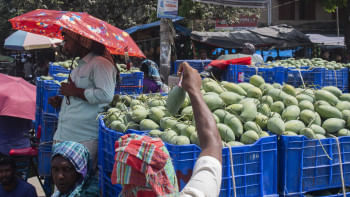Arrest identified war criminals, try them
Speakers at a discussion in the city yesterday called for the government to arrest those who have long been identified as war criminals and set up a tribunal to try them.
They also demanded the persons who have made derogatory remarks about the Liberation War be brought to trial on charges of sedition.
Addressing a meeting held between Ekattorer Ghatak Dalal Nirmul Committee, Prajanma '71 and Sammilito Sangskritik Jote, they said killing, rape, looting and arson alongside working against the country are the most abominable of crimes and those who committed those must not be allowed to get off scot-free.
It would be hard for an individual to prove the war crimes they had witnessed or been subjected to as so many years have gone by leaving little evidence intact to be used in the courts of law. So, the government should take the initiative in trying the war criminals, they observed.
National Professor Kabir Chowdhury said, “Those who have committed offence against the country must be brought to justice. The audacious remarks by Jamaat leaders denying their anti-liberation role and existence of Liberation War have made the situation intolerable.”
Citing examples of other countries having the war criminals tried, the speakers suggested that the caretaker government initiate the process by rounding up the persons whose involvement in war crimes can still be found well documented in different publications including the wartime newspapers.
“Both the army and the present government know who we are talking about. At least seven to eight people identified as war criminals by the People's Enquiry Commission should be arrested immediately. We are ready to help prosecution in terms of documentary evidence,” Prof Chowdhury added.
He said he hopes the Election Commission would not allow the religion-based parties including Jamaat-e-Islami to register with it.
Hailing different initiatives of the caretaker administration, he urged them to commission a committee to list the war criminals and gather evidence of the genocide in 1971.
Recollecting her visits to a number of rehabilitation centres accommodating victims of rape and assaults at the hands of Pakistan army and their collaborators, former Dhaka University teacher Naushaba Khatun said unfortunately, there is little or no information on those women who just seem to have sunk into oblivion.
Talking to The Daily Star, Justice KM Sobhan said, “It might not be possible for an individual to prove the crimes due to lack of hard evidence as 36 years have passed since the war.”
To explain his point, he said, “The first evidence required to try someone for rape is a medical report. Now after all these years how will the prosecution lawyer get that?”
The former judge also noted that the International Crime Act, 1973, a statute enacted by the then parliament, can come in handy in trial since it has records of all the cases filed for crimes committed during the Liberation War.
“It remains the responsibility of the state to bring the war criminals to book,” said Shahin Reza Nur, president of Prajanma '71.
“Why Ali Ahsan Mohammad Mojaheed, Quader Mollah and Shah Abdul Hannan not be charged with sedition when they continue speaking against the constitution, sovereignty and the freedom fighters? How come I was detained on charge of sedition for criticising the government activities?” questioned writer-columnist Shahriar Kabir.
Rabiul Hossain, Prof Muntasir Mamun, Shyamali Nasrin Chowdhury, Ferdousi Priyovashini, Touhid Reza Nur and Babul Chandra, among others, attended the meeting.

 For all latest news, follow The Daily Star's Google News channel.
For all latest news, follow The Daily Star's Google News channel. 



Comments